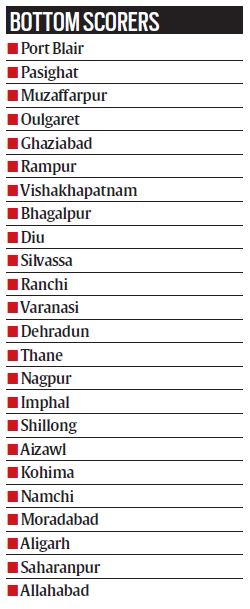Evaluating preparedness of Smart City contenders: Smaller towns take early lead
The cities have been ranked based on the extent to which they have communicated and taken public feedback on their plans through three basic online platforms.
By Shalini Nair
As the 98 selected Smart Cities lay their initial groundwork for the mission, smaller towns seem to have outperformed metros when it comes to using online forums to disseminate data and engage with citizens.
On a scorecard of 100 on web-based indicators, Tiruchirappalli and Mangaluru have been rated at above 90 with the other leading performers being Tumakuru, Indore, Raipur, Jaipur, Surat, Ujjain, Haldia and Kalyan-Dombivali.
None of the metros figure in the top twenty list. Chennai just about makes it to number 21. Others such as New Delhi, Mumbai and Hyderabad lag far behind. So do the two other major cities of Pune and Ahmedabad (Kolkata and Bengaluru are not Smart City contenders).
The cities have been ranked based on the extent to which they have communicated and taken public feedback on their Smart City plans through three basic online platforms: the urban local body (ULB) websites, Facebook page and the Union government website mygov.in.
The study on public data openness was initiated independently by a team of master students and alumni of urban planning at the Ahmedabad-based Centre for Environmental Planning and Technology (CEPT) University.
The group launched ‘Smart Cities Watch’ to periodically track the performance of cities through various stages of the mission. The project has now found support from the Union Ministry of Urban Development which has agreed to provide the data required, so that it can eventually act as one of the national tools to monitor the mission progress.
India-centric indicators
Saswat Bandyopadhyay, professor at the Faculty of Planning in CEPT, said that Smart Cities as a concept originated in the United Stated, traveled to Europe before finally coming to the developing nations. The team reviewed the existing globally used indicators for tracking Smart Cities, including those used by US Smart Cities Council, TU-Vienna, European Union and ISO37120 for Smart Communities.
“We found that none of the existing indicators for public data openness could be applied directly in the Indian context. This is because most cities here are still not equipped with the kind of data available in other global cities. For instance, there is hardly any city-level data on per capita energy use, carbon emission or GDP,” he said.
Bandyopadhyay added that internationally open data is the starting line for cities that decide to go smart. “In the global north, cities started using information and communications technology efficiently in the eighties and early nineties while Indian cities started one by one after a lag time of 15 years,” he added.
The study has showed that twelve of the 98 chosen Smart Cities do not even have a ULB website. Of the 86 cities that maintain their own websites, 37 are yet to update it with details on their Smart City initiatives. Of these, only 18 cities use their website as a medium to invite suggestions from citizens.
In terms of starting citizens’ forum for Smart Cities on the mygov.in website, 23 Smart Cities are not linked to the Union government website yet. Even in this case, the maximum citizens’ interaction has been from smaller towns. Bhopal and Indore lead with over 20,000 discussions each followed by Solapur and Jabalpur. The same is true for Facebook pages opened by 30 of the Smart City contenders. Barring Chennai, none of the metros such as Delhi, Mumbai and Hyderabad have started a separate Facebook page as a platform for citizen interaction.
The maximum activity has been recorded in the industrial town of Tumakuru in Karnataka, Kakinada in Andhra Pradesh and Tamil Nadu’s Tiruchirappalli. “Planning has not usually been very citizen-oriented and one of the indicators of the success of Smart Cities mission is to see how well cities disseminate data. The idea of this study was to provide city administrators with visuals that show them where they stand,” said urban planning student Supraja Krishnan, who along with her classmate Rajiv Reddy formed the core team for the study.
However, in a country where internet penetration is still very low as compared to global standards, it is debatable whether online engagement alone reflects the views of all inhabitants of a city. Pune presents an interesting case study that elucidates this aspect. With 13 lakh people, Pune is among the ten most populous cities in the country.
According to the Smart Cities Watch report, it is one of the few cities that have no presence on mygov.in website and yet it has received over 5 lakh responses on its Smart Cities project till date.
The highest number of responses any city has received on mygov.in is 28,000. Pune is the hub of Information Technology in Maharashtra. The city has its own mission web page as well as a Facebook page, Twitter handle and has even launched its smart city android app.
However, Pune municipal commissioner Kunal Kumar points out more than 70 per cent of the feedback to its Smart City mission has come from outside of online forums. “We carried out a door-to-door survey in which a total of 4.5 lakh households were covered including those in slums. We asked everyone one simple question: what is their vision for Pune. About 3.07 lakh households responded,” said Kumar.
Technology was then harnessed to analyse the data collected. The municipal body used the responses received to created a word cloud, a visual comprising of different words in which larger size of certain words indicates its frequency. “The answer that emerged was that people want Pune to be the most livable city. We then asked people to list their goals for such a city. About 1.04 lakh people listed a total of 13 lakh goals. Now we are at the stage where about 400 volunteers, including management students and IT professionals are working on generating citizen feedback on means to achieve these goals,” said Kumar.
Based on the feedback from its citizens on different areas such as public transport, housing, provision of basic services and security among others, Pune plans to firm up its Smart City plan by the end of November, way ahead of the Centre’s Smart City plan submission deadline in mid-December.
Method of rating the Smart City contenders on their public data openness
1. Official website (maintained by ULB)
a. Availability of website
b. Updates on smart city
c. Web page taking suggestions
2. MyGov.in
a. Smart City link to MyGov.in
b. Discussions on MyGov.in
3. Separate Facebook Page for the Smart City
a. Availability of official Facebook page for Smart City
b. Posts on Facebook page
c. Likes on Facebook page






